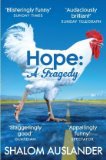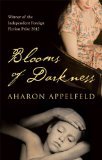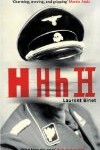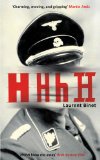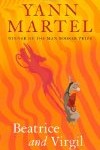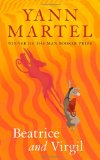

I loved Life of Pi so much that I bought a copy of Beatrice and Virgil from the US, months before it was released in the UK. Unfortunately my enthusiasm failed to pay off as I was very disappointed by it.
Beatrice and Virgil is a book about the Holocaust, but there are many points when it is almost impossible to see the connection.
The book begins with Henry, a successful author, ranting about a publisher refusing to let him write a book which combines non-fictional accounts of the Holocaust with fictional ones. One day Henry receives a strange package from a taxidermist, also called Henry, and is so intrigued he heads off to meet him. The taxidermist has written a play about a monkey and a donkey who live on a shirt. This play becomes the focus of the book, as the two Henrys discuss how to improve it.
The play is an allegory for the Holocaust, but the continual use of symbolism drove me mad. I’m afraid that I’m the type of person who prefers to call a spade a spade! I loved The Kindly Ones because it showed the Holocaust in all its horrific rawness, but although Beatrice and Virgil didn’t shy away from graphic violence, I found myself cringing as I read it rather than experiencing the sense of shock and sadness that I should have felt.
Another problem I had with the book was that it felt disjointed. For such a small book there were a lot of random elements thrown together, some so odd that they left me totally baffled. There was one point where they spent 8 pages trying to describe a pear – my eyes were rolling throughout:
BEATRICE: Like an apple?
VIRGIL: No, not at all like an apple! An apple resists being eaten. An apple is not eaten, it is conquered. The crunchiness of a pear is far more appealing. It is giving and fragile. To eat a pear is akin to…kissing.
BEATRICE: Oh, my. It sounds so good.
The end of the book contained a section called Games for Gustav. This is a series of questions about the moral dilemmas faced by those affected by the Holocaust.
GAME NUMBER ONE
Your ten-year-old son is speaking to you. He says he has found a way of obtaining some potatoes to feed your starving family. If he is caught, he will be killed. Do you let him go?
Each of these would make an interesting premise for a story, but placed together in this way I found them to be manipulative and irritating.
Overall I found that the whole book made my blood boil with rage. It could be said that this is a positive reaction; that it is far better for an author to create a book that is memorable in its dreadfulness than one which is dull and forgettable. I’ll leave you to make up your own minds!
Beatrice and Virgil is the perfect book club choice as I guarantee it will create discussion – people will be arguing about this book for years to come.

What did Yann Martel have to say about his book?
WARNING MAY CONTAIN SLIGHT SPOILERS
On 3rd June 2010 I went to see Yann Martel talk about his new book at the South Bank Centre in London. He was an entertaining speaker, willing and eager to answer questions from the public and regularly able to make us all laugh. I tried to make as many notes as possible, but the following is a summary of what he had to say – not direct quotes from him.
Why did you write the book?
I had noticed that there was an absence of fictional books about the Holocaust. People seem to be relaxed writing about wars, but are scared to write about the Holocaust. I wanted to fill this gap, so this book is an attempt to meet the Holocaust without being a witness.
Why did you use animals in the book?
The inspiration for using animals came from The Life of Pi. It is an obvious literary device, but I wanted to select animals that would be guides through the Hell that is the Holocaust. Selecting Dante’s guides seemed like a natural choice.
Why did you spend eight pages describing a pear?
Language trivialises pears. The section shows that no amount of words can adequately describe a pear, so how can we describe something as complex as war if we can’t even describe an object as simple as a pear?
What is the sewing kit about?
The sewing kit contains a lot of random literary elements. I wanted to list them together to see how many people would recognise and how many would “stick”.
Why did you give the central characters the same name?
The two central characters are both called Henry. This is because I didn’t want people to deduce anything about their personality from the name. I wanted to show that a person only lives the way they do by the random lottery of where they are born. We are all essentially the same.
Where is the book set?
The setting of the book is deliberately never mentioned. This is because I wanted the book to be universal – it could equally be set in almost any country of the world.
What is your next book about?
Three chimps in Portugal (note – I couldn’t decide if this is true or just a joke!)
What do you think?
Did you enjoy Beatrice and Virgil?
Is a book a success if it is memorable and provokes discussion?

